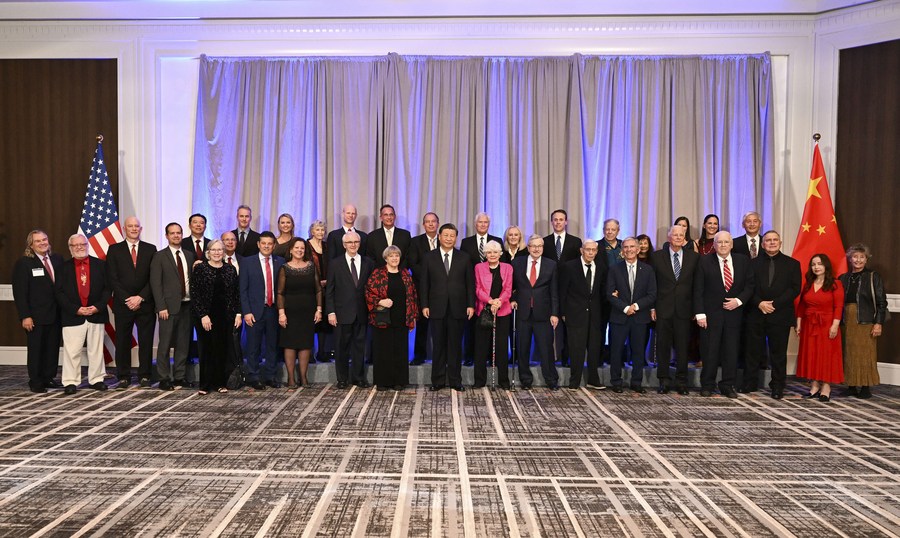'Old friends' in US hail benefits of bond with Xi
Ties: Beijing, Washington ‘can be partners, friends’

Editor's note: China Daily is publishing a series of stories reviewing President Xi Jinping's visits at home and abroad in the past decade, to showcase his vision for development in China and the world.

Traveling from the American Midwest to meet with Chinese President Xi Jinping in California in November provided an opportunity to discuss how the United States and China can successfully work together, said Bob Holden, chairman and president of the US Heartland China Association.
Holden, along with the association's strategic adviser, Kenneth Quinn, and its executive director, Min Fan, were among a group of "old friends" invited to meet with Xi. They shared their thoughts on the meeting in an online discussion on Tuesday.
Holden said he had pleasant interactions with several people from China during the event.
"I read his (Xi's) speech on the way back to Missouri. (It was) very thoughtful, very insightful, and I think it very much focused on how we build a bridge that works for everybody going forward," Holden said.
He encouraged people to get a copy of the speech that Xi gave in California "so that they can hear his words and his thought process". "I think we can build this foundation by looking at it from a win-win situation, not a win-versus-loss situation," he said.
Quinn, who is also president emeritus of The World Food Prize Foundation, said Xi's experiences have played a significant role in shaping China's approach to the US. Xi first visited the state of Iowa in 1985 as a county-level official from Hebei province.
"There is not going to be any future leader who will have had the kind of dramatic impact that President Xi had ... as a young man to Iowa," Quinn said.
Xi gave his old friends — many of whom are from Iowa — extra attention in California by having a private reception with them before a dinner banquet, where more than 200 other people from the US business community joined them, Quinn said.
Quinn said that Sarah Lande, who hosted Xi in 1985 in the Iowa city of Muscatine, sat at the head table with the president, along with a veteran member of the Flying Tigers, the group of US volunteer pilots who stood shoulder to shoulder with the Chinese in fighting Japanese aggression during World War II.
Through the seating arrangement, Xi "made the point that US-China relations were built upon these person-to-person and people-to-people relationships", Quinn said.
Fan said, "I think he truly enjoyed meeting his old friends."
Quinn and Fan said they were particularly struck by the fact that Xi talked about his own experiences in China's countryside when he was 15, and how that shaped his views toward eliminating rural poverty.
"When he talked about spending seven years in the countryside, he went off script. He talked about how much he really cared about people. I could feel that genuine emotion coming through," Fan said.
The three online panelists said that, in his speech, Xi asked, "Are we adversaries or partners?", and he said he wanted the two sides to be partners.
Quinn, who visited China twice in 2023, said China had initiated a series of programs in the past year to improve relations. He said that the US should have a discussion about how to answer the question that Xi asked.
"I believe that China is worried that the US and China are on a course to be adversaries, and that will lead potentially to some significant conflict, and they want the record to be clear if that happens, that they said, we can be partners, we can be friends," Quinn said. "So I thought the speech deserved a lot more attention than the American press gave it and that it was very significant for that reason."
Susan Thornton, the US Heartland China Association's vice-chair and moderator of the discussion, said the US needs to find ways to partner with China on a lot of things, because the two countries are the biggest global actors by far in areas such as economy, military, science and technology.
"I don't know if people are very aware of really how intertwined we are, how co-dependent we are in many, many areas, and how we're going to need to work together to solve a lot of the big challenges that the world faces," Thornton said.
Citing the concerns generated in the US by the economic rise of Japan in the 1980s, Thornton said national confidence could play a role in the current dynamic of US-China relations.
"I just hope that Americans can get confident enough to see that, basically, China is not a threat to our status, and our competitiveness, and our idea of ourselves," Thornton said. "We can both find a place in the world that satisfies our idea of ourselves, find that common ground and win-win place."
- Surging flu cases drive up demand for drug
- Nanchang funds 19 free funeral venues after tragedy
- Massive ice sculpture replicates CNS?Liaoning aircraft carrier
- China to enhance to improve carbon footprint
- Experts advocate vaccinations to combat flu cases
- Singer Lu Han apologizes for inappropriate behavior





































